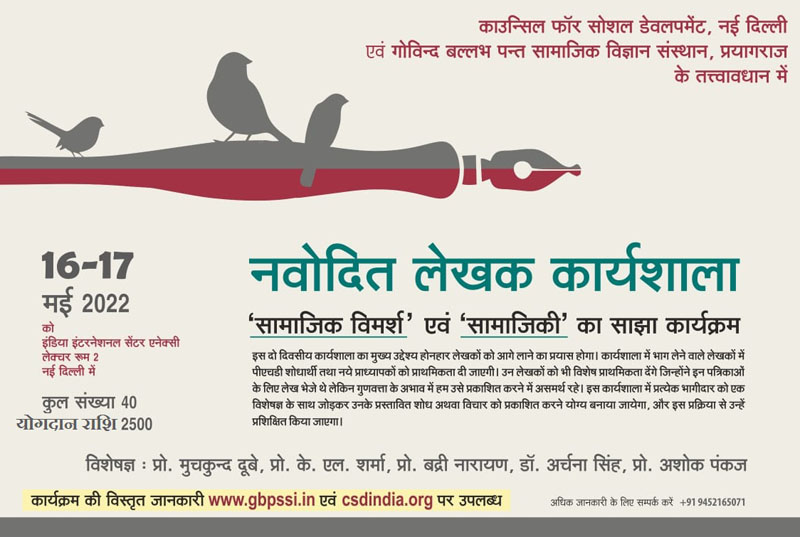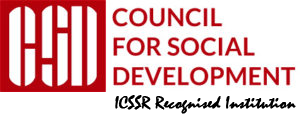A Two Day Workshop of Hindi Writers in Social Sciences

A Two Day Workshop of Hindi Writers in Social Sciences at New Delhi on 16-17 May, 2022
A joint venture of Samajik Vimarsh, Council for Social Development, New Delhi and Samajiki, G.B. Pant Social Science Institute, Prayagraj.
Dates: 16th – 17th May 2022
Venue: Lecture Room – II, IIC Annexe, New Delhi
CSD-ISID-IIC’s Book Discussion on ‘India’s Industrial Policy and Performance’
CSD-ISID-IIC’s Book Discussion on ‘India’s Industrial Policy and Performance’ by Nitya Nanda, Thursday, 12 May 2022. What implications have the post-1991 shift towards a ‘no policy is the best policy’ had for India’s industries and their performance? How best to undertake a comprehensive policy analysis and what would such an analysis throw up as suggestions for India’s industrial policy?
These were some of the questions addressed by experts gathered at India International Centre Annexe (hybrid mode) on Thursday, 12 May 2022 for a book discussion on ‘India’s Industrial
Policy and Performance’ by Nitya Nanda. The event was co-organised by Council for Social Development (CSD) Delhi, Institute for Studies in Industrial Development (ISID) Delhi, and India International Centre (IIC).
Moderated by Prof Nagesh Kumar (Director, ISID), the event began with the book author, Dr Nitya Nanda (Director CSD), explaining the importance of a comprehensive policy analysis – not just of India’s industrial policy but also of trade and investment policies and other development incentives – to understand India’s industrial policies and the performance of India’s industries.
While advocating a structural economic perspective towards this field and cautioning against an over-reliance on econometric models and analysis, Dr Nanda also noted that market failures are ubiquitous rather than exceptional. He also shed light on the fact that the only well-performing sectors – pharmaceuticals and automobile manufacturing, for instance – were those that still had a semblance of an industrial policy.
Subsequently, the experts in the panel – Prof Muchkund Dubey (President CSD), Prof Deepak Nayyar (Professor Emeritus, JNU), and Prof R Nagaraj (Visiting Professor, CDS Trivandrum) – placed several important observations on India’s industrial sector and sub-sectors.
Prof Dubey briefed the audience of India’s industrial policies since 1948, emphasising the state’s role in establishing and supporting institutions, the need to set up a manufacturing
sector capable of delivering key universal goods and services to all citizens, and the urgent need for the government to realise that rich rhetoric is not a substitute for policy implementation.
Noting the private sector’s disinterest and inability to deliver on these fronts, Prof Dubey called for greater state involvement in planning and implementation of industrial policies that dovetail with critical social development issues. He also recommended that the state make serious efforts in social sector transformation and in remedying the long-standing neglect of India’s agriculture. Both these sectors, he said, ought to be part of an integrated approach to India’s industrial policy.
Prof Deepak Nayyar (Professor Emeritus, JNU) highlighted that the contribution of India’s manufacturing sector to employment had peaked prior to market liberalisation. Challenging the
currently popular opinion that derides the 1950s-80s as a no-show, licence-raj period that had harmed manufacture through state interference and encouragement of rent-seeking behaviour, Prof Nayyar stressed that the country’s only three success stories – pharmaceuticals, automobiles, and software – had all derived their strengths and encouragement from the
policies and practices of these early post-independence decades, which ought to be recognised as a period of learning for Indian industries. Noting the irony in the worsening, rather than the improvement, of India’s manufacturing sector alongside its increased economic openness since 1991, Prof Nayyar strongly recommended that this sector be recognised as the only viable
source of employment. Instead of relying on the service sector to absorb its vast surplus labour, India must turn towards manufacturing, he suggested. Prof Nayyar also said it is time to go
beyond the ‘Make in India’ slogan and put in place an integrated policy and coordinated efforts to nurture an ecosystem conducive to manufacturing.
The third panellist, Prof R Nagaraj (CDS), spoke at length about the merits of the book under discussion while using the occasion to commend the policies and outlook of the Indian state
since 2014 in creating better opportunities for industries. Former Vice Chairman, NITI Aayog, and the event’s chief guest, Dr Rajiv Kumar, likewise praised the current government, its
infrastructure and ease-of-doing-business initiatives, and its thrust on turning India into a globally competitive player. Dr Rajiv Kumar and other panellists also released the South Asia
edition of Dr Nanda’s book.
In his concluding remarks on the event, Prof Nagesh Kumar (ISIS) re-emphasised the importance of a symbiotic relationship between the government and industries and other stakeholders. Ms Shoma Chaudhury, Senior Commissioning Editor, Routledge Taylor & Francis Group, gave the vote of thanks.
A video recording of the event is accessible at
